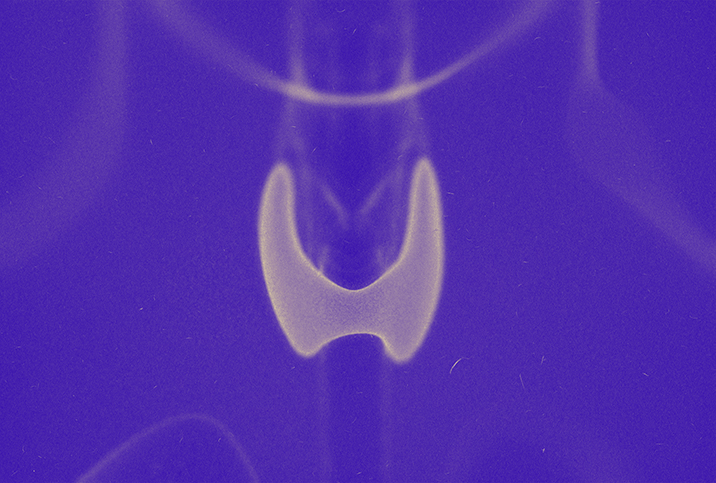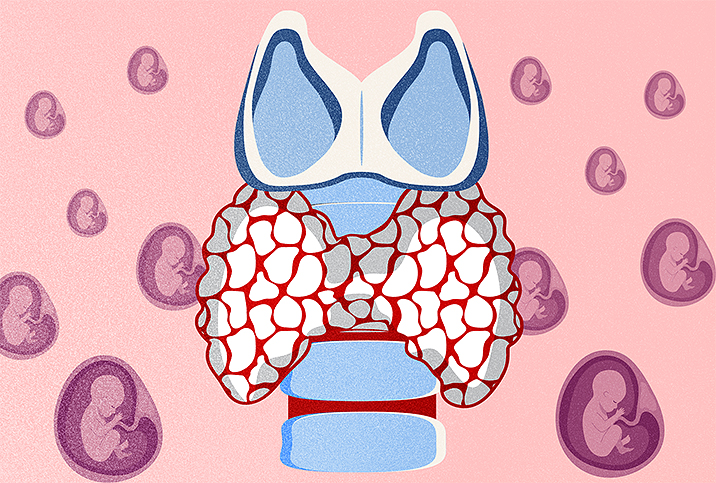Is It Menopause or Thyroid Disease? Here's How To Know

Your thyroid is a butterfly-shaped gland located at the front part of your neck. It plays a crucial role in regulating metabolism, or how your body converts food into energy.
Disorders of the thyroid can severely impact your health.
Sometimes, women experiencing menopausal symptoms confuse their symptoms. This means that they may have thyroid symptoms but chalk it up to the symptoms of menopause instead and don't seek treatment.
So how can you know if it's menopause or thyroid disease causing your symptoms?
What are the causes and symptoms of thyroid disorders?
All of your body's systems need energy to function. The thyroid assists in several bodily functions—heart rate and metabolism among them—by releasing a steady amount of thyroid hormones.
'As women age, the thyroid gland may become less efficient at producing thyroid hormones, leading to a decline in thyroid function.'
Thyroxine and triiodothyronine are two of these hormones. When the thyroid gland produces too little of these thyroid hormones, you may get a condition known as hypothyroidism. On the other hand, if it's producing too much of these thyroid hormones, you may get a condition known as hyperthyroidism.
Hypothyroidism
The most frequent cause of an underactive thyroid is an autoimmune disease known as Hashimoto's thyroiditis. The immune system attacks the thyroid gland, leading to inflammation and damage and greatly hampering your thyroid's production of hormones.
Iodine deficiency is another factor contributing to hypothyroidism since iodine is required to synthesize thyroid hormones. It is one of the most common nutritional deficiencies, affecting 35 percent to 45 percent of the global population, according to a report published in August 2022.
"The other most common cause is if you've had a kind of treatment for an overactive thyroid. It can make your thyroid go underactive," said Zoe Schaedel, M.B.B.S., a general practitioner specializing in menopause at Myla Health, with multiple locations in the United Kingdom. "So it's either an autoimmune cause or it's usually due to a treatment of some kind. And what happens is your thyroid just slows down and stops producing as much of that really important hormone, thyroxine."
Very often, the changes are gradual, she added, so there's more than one symptom to watch for.
If you have an underactive thyroid, you may experience symptoms such as:
- Brain fog
- Decrease in fertility
- Dry skin
- Fatigue
- Feeling cold
- Heavier periods
- Irregular periods
- Weight gain
A doctor or endocrinologist can diagnose hypothyroidism with a simple blood test.
Hyperthyroidism
The most common cause of an overactive thyroid is Graves disease, an autoimmune disease that triggers the immune system to generate antibodies that stimulate the thyroid gland to produce excess hormones.
As a result, the overproduction of thyroxine hormone speeds up certain body processes and metabolism in general.
Other causes of hyperthyroidism include excessive iodine intake, thyroid cancer, a pituitary adenoma (a noncancerous tumor of the pituitary gland) or noncancerous nodules on the neck.
Hyperthyroid symptoms include the following:
- Anxiety
- Excess sweating
- Hot flushes
- Insomnia
- Irregular periods
- Mood swings
- Palpitations or a fast heart rate
- Weight loss
How are thyroid disorders and menopause connected?
Thyroid disorders occur more commonly in women than in men, especially menopausal women. According to the Office on Women's Health, 1 in 8 women will develop thyroid problems in their lifetime.
"As women age, the thyroid gland may become less efficient at producing thyroid hormones, leading to a decline in thyroid function," said Greg Brannon, M.D., the medical director at Optimal Bio, a bioidentical hormone replacement therapy (BHRT) practice with locations in North Carolina, South Carolina and Virginia. "Women experience a decrease in sex hormone levels such as estrogen during menopause, which can impact thyroid hormone levels."
Estrogen is important for regulating thyroid hormone production, so a decrease in estrogen means a decrease in the thyroid hormones being produced.
Menopause is also often accompanied by a decrease in testosterone levels in your body, which is another sex hormone that aids in the growth and repair of your reproductive tissues.
"Testosterone levels can also influence thyroid hormone production," Brannon said. "Low testosterone levels have been linked to lower levels of thyroid hormones."
All of this means that if you're going through menopause, it may be difficult to differentiate whether you have a thyroid disorder or your symptoms are related to menopause.
Some of the symptoms that menopause and thyroid disorders share include:
- Brain fog
- Fatigue
- Irregular periods
- Low mood or low energy
- Stress
- Temperature issues, such as hot flashes or feeling cold
- Weight gain
Differentiating between thyroid disorders and menopause
Fortunately, medical professionals can distinguish between the two conditions.
A diagnostic blood test is often recommended to diagnose thyroid disorders. It's pretty accurate and the surest way to know if there's a problem with your thyroid gland.
You would either see a very low thyroxine level for an underactive thyroid or a high thyroxine level for an overactive thyroid.
"For women with menopausal symptoms and are undergoing treatment such as hormone replacement therapy (HRT), if you notice that your symptoms are not getting better, it's really important to think whether something else is causing these symptoms as well," Schaedel advised.
How to treat thyroid disorders in menopausal women
In most cases, thyroid disorders are treated using medication.
For hypothyroidism, your healthcare practitioner may prescribe medication such as levothyroxine, which replaces the missing thyroid hormone thyroxine.
Once you start the medication, you may need to undergo regular blood tests to make sure you are getting the right dose and that your thyroid hormone levels go back to normal.
For hyperthyroidism, the mainstay medications are carbimazole, methimazole and propylthiouracil. They work by blocking the synthesis of thyroid hormones by the thyroid gland. In most cases, you'll need to stay on these medications for a year to 18 months, and it might be months before you start to feel a benefit from the drugs. Your doctor may prescribe a beta blocker while you're waiting for the drugs to take full effect.
Surgery may also be an option depending on the cause of your thyroid disorder. A thyroidectomy is a minimally invasive operation performed through the front of the neck to remove all or part of your thyroid gland.
While iodine is essential for normal thyroid function, there isn't much evidence that dietary changes can improve or treat your thyroid disorder.
The menopausal transition can be rough for some women. If you're experiencing symptoms that interfere with your lifestyle, your best strategy is always to see your doctor. A simple blood test can determine if how you're feeling is a result of menopause or an issue with your thyroid.


















